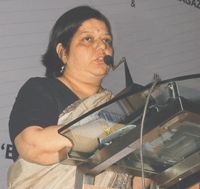 Early childhood education (ECE) programmes in India range from formal pre-primary education offered in pre-schools, to informal and home-based activities. ECE programmes are run by private individuals, NGOs, corporates and franchisees.
Early childhood education (ECE) programmes in India range from formal pre-primary education offered in pre-schools, to informal and home-based activities. ECE programmes are run by private individuals, NGOs, corporates and franchisees.
At present, early childhood education in India is in a state of flux. The recently enacted Right to Education Act guarantees free and compulsory education to children in the age group 6-14 years, completely ignoring children in the pre-school age group. Moreover, there are no regulatory barriers for entry into this field and there is full freedom for promoters to design and develop learning programmes. Conse-quently the growth of pre-schools across the country has not been even, nor has ECE shown appropriate results in terms of access, efficiency and effectiveness.
Research clearly demonstrates that children exposed to poor quality ECE environments are likely to experience troubled social and emotional development, and are likely to be less prepared for formal school education. Given the unregulated growth of pre-schools across the country and variations in quality of curriculums, it is imperative that a quality assurance system is introduced to ensure that all pre-school learning programmes conform with minimum standards.
Regulation is an important prerequisite of promoting and safeguarding quality in early childhood education. When basic curriculum standards and norms are devised and applied, families and communities have greater confidence in the quality of education provided and are better equipped to make informed choices. Regulation also helps educators improve their professionalism.
One form of regulation used by many countries is the licensing system. In licensing, minimum standards of safety, hygiene, infrastructure, and academics are prescribed by government. However for the licensing system to work effectively, large government machinery is required to conduct inspection visits, assess and renew licenses. Experience of countries using this system shows that it’s not a very effective means of regulation.
Therefore a better way of regulating quality in pre-school education is through the accreditation process, which is essentially an endorsement of quality awarded by a peer group. It’s a process that involves self assessment and peer evaluation with peers generally being representatives of a professional network.
Moreover, one of the critical factors which makes a significant difference to the quality of pre-school programmes is professional teachers. In the Indian context training of pre-school teachers is of questionable quality. The duration, content and assessment of training programmes are so varied that there are huge differences in teacher performance. Therefore it is also essential that we define the core competencies of a pre-school teacher and develop training modules accordingly. The recent tendency of organisations to develop customised teacher training programmes for each pre-school is myopic and will not create a national pool of talented early childhood education professionals.
It is time these issues of regulation and professional development are addressed as the number of ECE providers is growing rapidly. For sometime now networks such as Association for Early Childhood Education and Development, and Forum for Creche and Child Care Services have tried to evolve minimum standards for early childhood education programmes in India. Setting standards and benchmarks is the first step towards regulation. Then these standards must be debated and accepted by all stakeholders.
If the ultimate aim is to give every child the right to quality early childhood education, we must accept regulation as an important prerequisite of developing quality programmes.
(Dr. Vrinda Datta is professor at the Tata Institute of Social Sciences, Mumbai and president of the Association for Early Childhood Education and Development)